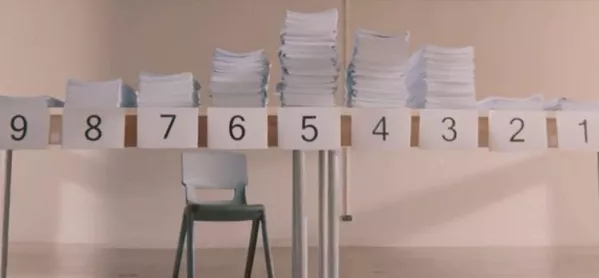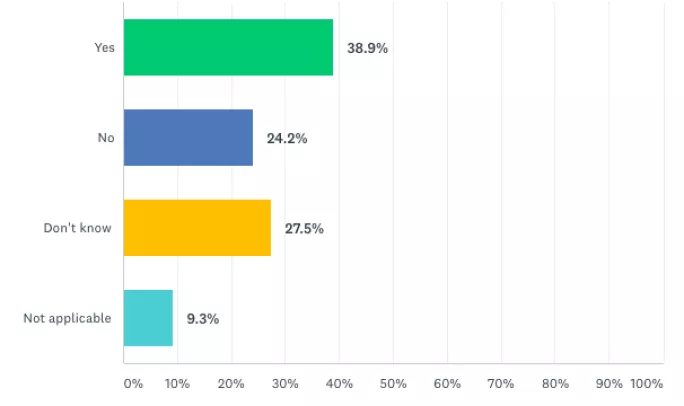- Home
- GCSEs: Only 39% teachers think 2020 grades fair for all
GCSEs: Only 39% teachers think 2020 grades fair for all

Fewer than half of teachers and other school staff in England believe that all GCSE and A level candidates will get a “fair deal” from teacher-assessed grades this summer, Tes can reveal.
They have expressed concerns about potential teacher bias and favouritism, and a lack of “accuracy” compared to exams.
The findings uncover serious misgivings about the 2020 grading system among the very people on whose judgements it will be based.
They come from a Tes survey responded to by more than 19,000 UK school staff that has already revealed serious concerns about teacher safety, and the DfE response, and provided detailed insights into how lockdown education has worked.
Related: Teacher-assessed A-level grades ‘will be unfair’
News: School social distancing ‘impossible’, say 74% of staff
Exclusive: Give PPE to all of us, say 3/4 school staff
GCSE and A-level grades are to be calculated and based on teacher assessment this year following the coronavirus lockdown cancellation of summer exams.
But the news that just 39 per cent of school staff in England think the system will be fair to all reveals a lack of confidence in the system from many of the teachers at the heart of it.
UK school staff were asked by Tes: “Do you think GCSE and A-level students will all get a fair deal from their teacher-assessed grades this summer?”
In England, nearly a quarter (24 per cent) of staff responding said “no” the grades would not be fair for all, while 37 per cent said they didn’t know or felt that the question was not applicable to them.

In Wales, 50 per cent of secondary staff say it will be fair for all and 32 per cent say it won’t. Secondary staff in Northern Ireland are the most positive, with 57 per cent saying the grading with give all a fair deal and 26 per cent saying it won’t.
Some of the reasons cited by teachers with misgivings included:
- Teacher-assessed grading would potentially be biased against pupils from black and minority ethnic backgrounds, with one respondent stating that “research suggests that BAME students are perpetually under graded by their teachers” and that the grading process would not be valid or ethical.
- That predictions and staff assessments would never have the same validity as an exam. One respondent said: “There is an infinitesimally small chance that every student will be awarded the grade that they would have achieved, had they sat the exams this summer. Predictions, past assessment data and mock data is not sufficient, and will never beat the real thing in terms of accuracy.”
- Some expressed concerns about the moderation process and reported that colleagues in independent schools, or they themselves, had been asked to elevate grades or ask for extra work from pupils to go towards teacher-based judgements. “Some schools are cheating the system and requesting that children attend school and sit additional assessments to assist with the grading process....for sure it is rife amongst the independent sector,” one respondent said.
- Others pointed out that some pupils revised for important exams in the final months of the year and would be penalised by this process, although others said those who worked more steadily and suffered from exam nerves would benefit. “Every year, there are a proportion of young people who work extremely hard in the weeks leading up to exams. This year those students will receive grades that do not represent their ability or effort. I believe these pupils will tend to come from lower social classes and receive lower levels of parental support,” one respondent commented.
- Some said many students tended to do better in final exams, and that by taking primary school data and the school’s past performance into account “some students will miss out on the grades that they could and would have got if they’d sat exams”.
- And others said they were concerned about teachers’ “favouritism” regarding the assessment of their own children and the possibility of subjective bias in human judgements.
- However, some commented that the process was as fair as it could be in the circumstances. “There is no perfect solution to this problem - letting the teachers decide is the best way, but who can say (and some students will argue this) that they would have done better in the ‘actual’ exams,” one respondent said.
Teachers in independent schools had broadly similar opinions, although there was a noticeably higher proportion with a negative view.
Of the more than 2,000 private school staff across the UK who answered the grading question, 38 per cent said it would be fair for all and 27 per cent said it would not. That compares with 39 and 23 per cent, respectively, of UK state school staff.
An Ofqual spokesperson said: “Following the government’s decision to cancel exams to help fight the spread of coronavirus (Covid-19), we set out exceptional arrangements for awarding students grades so they can progress to the next stage of their education or training.
“The approach to grading that we have taken is the fairest possible given the unprecedented circumstances.
“School or college-based assessment already has an important role in many GCSEs, AS and A levels, and teachers are best placed to judge the likely performance of their students at the end of the course.
“The guidance we have developed sets out how teachers can work together to best make objective, evidence-based judgements of student performance and we are confident that teachers will be able to apply this fairly and consistently within their school or college.
“We have worked closely with the teaching profession to ensure what we are asking is both appropriate and manageable, so that everyone can have confidence in the approach, and all centre assessment grades submitted will go through an external standardisation process to better ensure they are comparable between schools and colleges.
“We will also take account of any responses to our recent consultation from the teaching profession when finalising our approach.”
The Department for Education was contacted for comment.
Register with Tes and you can read two free articles every month plus you'll have access to our range of award-winning newsletters.
Keep reading with our special offer!
You’ve reached your limit of free articles this month.
- Unlimited access to all Tes magazine content
- Save your favourite articles and gift them to your colleagues
- Exclusive subscriber-only stories
- Over 200,000 archived articles
- Unlimited access to all Tes magazine content
- Save your favourite articles and gift them to your colleagues
- Exclusive subscriber-only stories
- Over 200,000 archived articles



